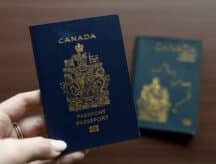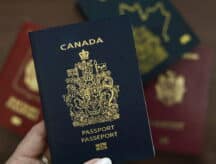How to become a Canadian citizen
Canadian citizenship holds much significance and meaning for a lot of people. For many, Canadian citizenship is a promise of a better life.
From May 23 to 29 this year, Canada is celebrating Citizenship Week. The Canadian Citizenship Act came into effect on January 1, 1947, under the government of Prime Minister William Lyon Mackenzie King. Since then, the Citizenship Act has been amended to reflect Canada's values as a multicultural society. The pandemic further pushed innovation in Canadian citizenship by introducing virtual citizenship ceremonies.
Immigration Minister Sean Fraser further elaborated on some of the changes to the Citizenship Act, which are moving toward a more inclusive Canada.
Schedule a Free Canadian Citizenship Consultation with the Cohen Immigration Law Firm
https://youtu.be/jZZKlxOh85I
"Canada is known around the world as a country that respects and celebrates our differences," reads a quote attributed to Minister Fraser in a media release. "As we have grown, we have amended our Citizenship Act so that it reflects our values and promotes an inclusive society."
"Most recently, these amendments include broadening the interpretation of 'citizenship by descent' to be more inclusive for families," the minister continued. "They also include establishing a new Oath of Citizenship that recognizes the inherent and treaty rights of First Nations, Inuit and Métis peoples, and the obligation that all citizens have to uphold the treaties between the Crown and Indigenous nations. We are committed to ensuring that the tragic parts of our history are not forgotten, as we continue on the path of reconciliation."
As a citizen, you get a number of privileges that are not available to permanent residents, such as voting and holding a Canadian passport. Here are some of the steps that Canadian permanent residents must take in order to become eligible for citizenship.
How to become eligible for Canadian citizenship
Become a permanent resident
If you have already passed this step, keep scrolling. Otherwise, see if you are eligible for more than 100 Canadian immigration programs.
Meet residency requirement
You must have been physically present in Canada for at least 1,095 days (three years) during the five years before the date you apply for citizenship. Immigration, Refugees and Citizenship Canada (IRCC) encourages you to apply with more than 1,095 days of living in Canada to avoid calculation problems.
If you were in Canada as a temporary resident, you may be able to count that time toward your residency requirement as well. Each day that you spent in Canada as a temporary resident or protected person in the last five years counts as a half-day when you calculate your physical presence. IRCC allows you to include up to 365 days as a temporary resident or protected person toward your physical presence calculation.
Temporary residents include visitors, students, workers, or temporary resident permit holders. Protected persons are those who were found to be in need of protection or a convention refugee by the Immigration and Refugee Board or who received a positive decision on a Pre-Removal Risk Assessment from IRCC.
Generally speaking, time spent outside of Canada does not count towards your physical presence requirements but there are some exceptions. For example, permanent residents who work in the United States may be able to count days spent in the US towards their physical presence requirement as long as they reside in Canada and return to Canada for at least part of the day.
Try CanadaVisa's Citizenship Calculator
File your taxes
You may have to file taxes in Canada for at least three years within the five years before you apply for citizenship.
Even if you lived in Canada for only part of a year, you may be required to file an income tax return if you:
- Have to pay tax for the year
- Want to claim a refund
- Want to get benefit and credit payments
Pass a Canadian citizenship test
Those between the ages of 18 to 54 on the day of their Canadian citizenship application must take a citizenship test. Participants are quizzed on the rights and responsibilities of Canadians, Canada’s history, geography, economy, government, laws, and symbols. The test is 30 minutes long, it can be taken in English or French, and it contains multiple-choice and true or false questions. In order to pass, you need a mark of 15 out of 20.
Prove your language skills
Those aged 18 to 54 must also show they can communicate in English or French by achieving a Canadian Language Benchmarks (CLB) level of 4 or higher in reading, writing, listening, and speaking. IRCC assesses your language proficiency in a number of ways, such as:
- Reviewing the evidence you submit with your application
- Noting how well you communicate with citizenship officials during the application process
- Assessing your language skills during a hearing with a citizenship official, if necessary
Proof of language ability can include your educational credential or transcript submitted in English or French (IRCC accepts certified translations), or evidence you attended a secondary or post-secondary educational program in English or French whether abroad or inside Canada. It could also be the results of the language test you have completed as part of your Canadian permanent residence application.
Become a Canadian citizen
More than 85% of Canadian immigrants become citizens. An immigration lawyer can help you through the Canadian citizenship process.
Schedule a Free Canadian Citizenship Consultation with the Cohen Immigration Law Firm
© CIC News All Rights Reserved. Visit CanadaVisa.com to discover your Canadian immigration options.
- Do you need Canadian immigration assistance? Contact the Contact Cohen Immigration Law firm by completing our form
- Send us your feedback or your non-legal assistance questions by emailing us at media@canadavisa.com







